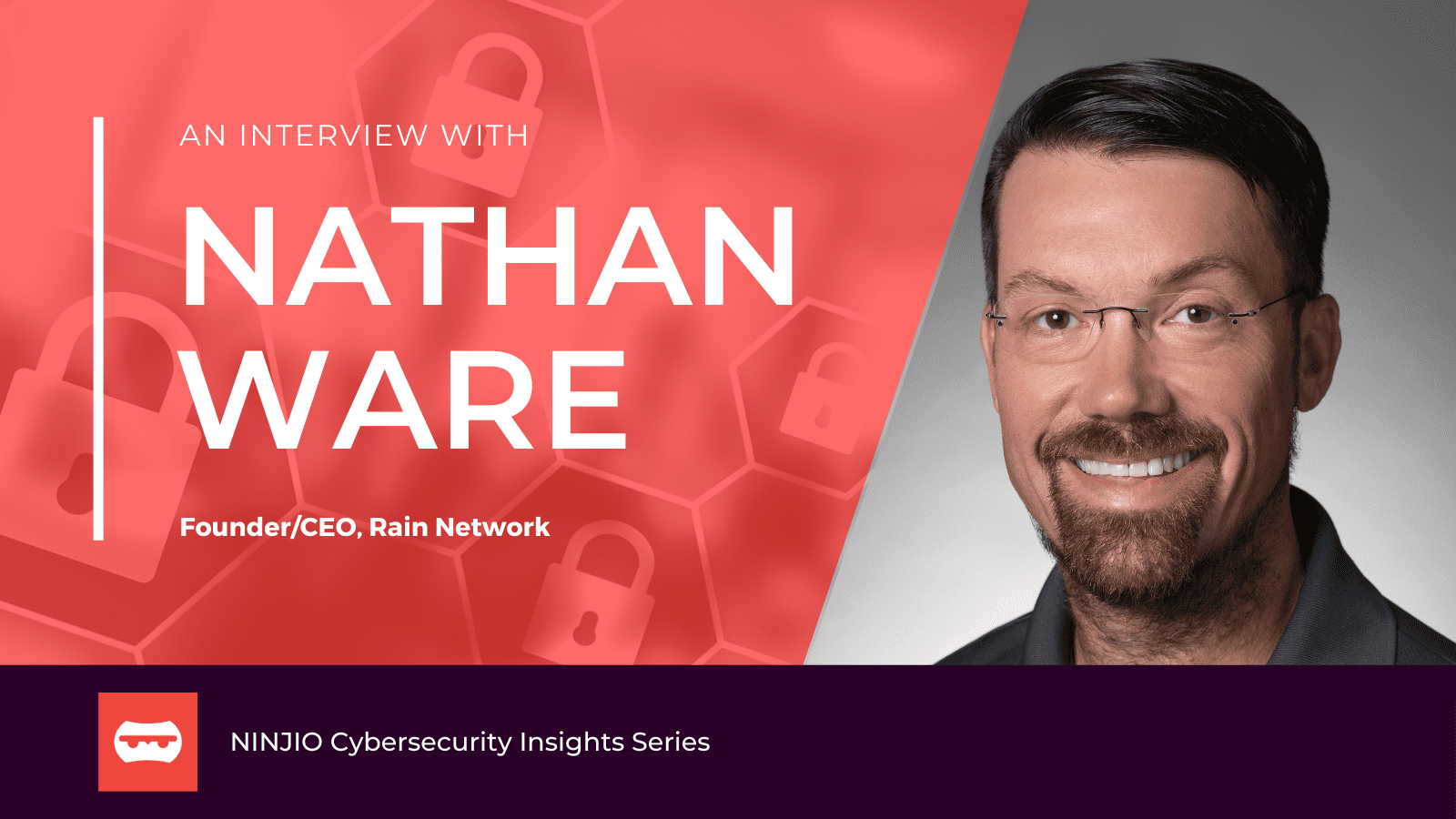
16 Sep An Interview with Rain Networks Co-founder Nathan Ware
This interview is part of our Cybersecurity Insights Series, where we tap our partners and industry experts for the latest trends, thoughts, and predictions for cybersecurity and beyond.
As cyberthreats continue to multiply and become more sophisticated, companies are trying to figure out how they can develop cybersecurity platforms that are effective and easily integrated with their workforces. As a cofounder of Rain Networks – which sells security solutions to thousands of customers across North American – Nathan Ware is an expert on how companies can do just that. He was generous enough to answer a few of our questions about his company, changes in the cyberthreat landscape, and how companies can stay secure.
Zack Schuler: What’s the origin story of Rain Networks? How would you describe your mission and what you do?
Nathan Ware: I founded Rain Networks with a partner, Robert – we previously worked for a VAR [value-at-risk] security sales team starting in 1998, so we were good at selling security solutions. After the dotcom bust, a lot of VAR companies went under. Then in 2002, Windows XP created a renewed need for security expertise.
So we started RN in 2003, and a year later we connected with Kaspersky (they were new to the United States at that point). They said they wanted to develop a reseller network, so we took on the challenge. At that point, the resellers were computer shops in strip malls and we started selling Kaspersky to them. This meant we were a “reseller network” rather than a VAR, and we knew we could replicate this model.
This was when we left our VAR days behind and became a distributor. We’ve brought on many more companies since then: ESET, ProofPoint, Barracuda, and NINJIO. In the last decade, we’ve worked with security-focused distributors that help managed service providers avoid getting hit with ransomware.
ZS: You’re an expert in finding quality technology partners and solutions for your clients’ needs. What’s your criteria for bringing providers into your network?
NW: The provider has to focus on security, as that’s our area of expertise; the customer base is comprised of managed service providers, so products have to fit into the business model for them; the products have to be sold in a monthly format, because MSPs are moving away from annual licensing; and the manufacturer itself should have a shortage of sales staff to onboard the resellers. We tackle the busy work and billing components.
ZS: How does NINJIO meet this criteria? How and why would you recommend NINJIO to your clients?
NW: You fulfill all of the above criteria and have a structure that fits. The training NINJIO provides helps MSPs educate end users on how to avoid getting infected with ransomware. NINJIO makes security awareness training way more fun and keeps people engaged.
ZS: How do you feel the pandemic has changed the way companies use technology? In what areas do you see the most growth (or the most demand?)
NW: People aren’t just working on internal networks anymore. Network security is now dispersed and IT managers don’t have as much oversight. There has been a decrease in the number of devices that IT managers have to work with – 200 devices in an office versus a home computer, phone, and iPad.
ZS: Cybersecurity is exploding as one of the top priorities for companies across industries. What cybersecurity trends are you seeing among your clients and partners?
NW: Two-factor authentication is finally growing – it feels like that took forever. Password management has become more of a focus, working from home requires VPN usage, and web portals have been exposed to outside use. Managed detection and response (MDR) – hiring outside companies to manage when a detection happens – is becoming more common.
ZS: What are your thoughts on cybersecurity as hackers get smarter and more sophisticated?
NW: First of all, everyone needs security awareness training. Hackers are always looking for vulnerabilities in software – how can we as an industry not get a grasp on this? I hate to pick on Microsoft, but they make operating systems that are susceptible to cyberattacks. Windows XP, since it was like a malware magnet, was literally a catalyst for us starting our company. We knew people needed solutions to protect XP machines. There are still tons of vulnerabilities in the OS – this year we had a massive Microsoft Exchange issue.
ZS: Overall, what are your predictions for the future of business technology in the coming years?
NW: I would guess that we are going to see in the next 10 years a lot less Windows-driven devices at the heart of business America – I think this is going to erode. We are seeing a lot more Chromebooks, and while Apple isn’t penetrating the business market, it’s making inroads in the home business market for sure.
ZS: How do you see Rain Networks growing to meet the demands of a rapidly-changing, tech-hungry marketplace?
NW: I think in the short term the problems will stay the same, and a lot of our products are geared toward defending email. Five to ten years ago, people thought email would tail off (we’d all be using Slack instead), but we are still very much an email culture – so we’ll keep doing stuff centered around that. Delivery of malware and ransomware via mobile devices will likely take off in the next few years.
###
